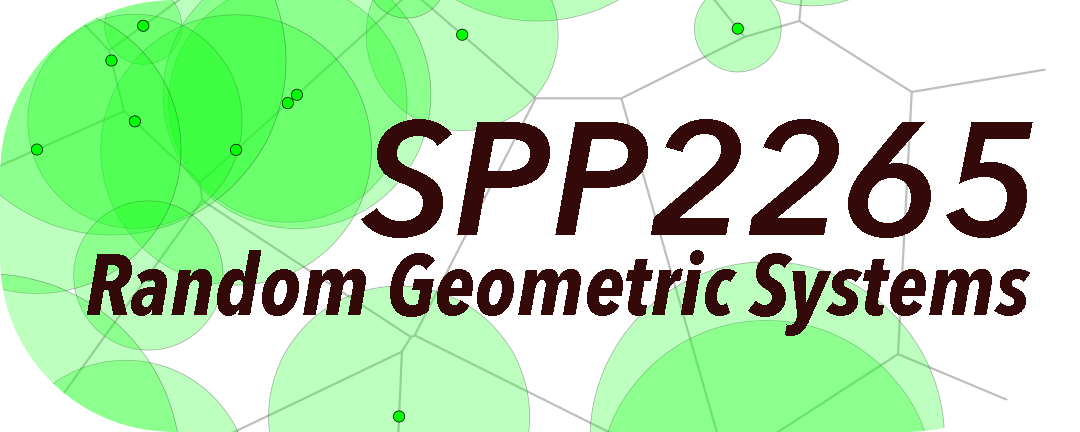Context
Welcome to the homepage of the Deutsche Forschungsgemeinschaft (DFG, German Research Foundation) Priority Programme "Random Geometric Systems" (SPP 2265 "Zufällige geometrische Systeme").
Phenomena that emerge from an interaction between random influences and geometric properties are ubiquitous and extremely diverse. They appear in physics (e.g., condensation or crystallisation in interacting random particle models for equilibrium situations), materials science (e.g., electrical conducting properties in metals with impurities), in telecommunication (e.g., connectivity in spatial multi-hop ad-hoc communication networks), and elsewhere. The origins and the mechanisms that lead to the phenomena are often deeply hidden. Bringing them to the surface often requires serious research activities, many of which have to be theoretical by the nature of the problem.
Scientific Focus
This Priority Programme is devoted to the mathematical analysis of effects and phenomena that emerge from an interplay between randomness and geometry. Many questions of intrinsic mathematical interest will be studied. Disciplines like physics, materials science and telecommunication will be crucial sources of problems, applications, motivations, models and solutions. The main focus will lie on the development of new and the refinement of existing methods, and on the creation and analysis of new random spatial models.
Goals comprise
- rigorous description and analysis of emergence of macroscopic phenomena like condensation, percolation, crystallisation;
- geometric functionals of random structures like Minkowski functionals and tensors, and cluster counts;
- new limiting geometries; geometric systems driven by correlated spatial randomness;
- metastability in spatial processes away from equilibrium;
- effects arising from kinetic or geometric constraints;
- new applied spatial random models.
Research areas
The Priority Programme is expected to push forward substantial developments into various timely directions, like time-dependent random media, continuous-space modelling, long-range dependence of interactions, description of entire geometries instead of characteristic quantities, or the introduction of spatiality into mean-field models.
The research in this Priority Programme will mostly concern:
- random point processes,
- random fields,
- percolation in the continuum,
- random geometric graphs,
- energy-based random point configurations,
- stochastic processes and dynamics in random media.
Establishing cross-connections will be highly welcome.
Analytical work shall be dominant in this Priority Programme. Important impulses and progress will also come from the field of mathematical statistics; mathematical work that leads to the development of statistical tools for the analysis of geometric data will be welcome in the Priority Programme. Furthermore, also numerical and modelling work as well as a systematic transfer of questions from the applied sciences into mathematics will substantially contribute to the success of the programme.
Coordination
Prof. Dr. Wolfgang König
TU Berlin / WIAS Berlin
wolfgang.koenig[at]wias-berlin.de
Website Management
Dr. Willem van Zuijlen
WIAS Berlin
spp2265[at]wias-berlin.de
Programme Committee
-
Prof. Dr. Nina Gantert
Technische Universität München -
Prof. Dr. Günter Last
Karlsruhe Institute of Technology -
Prof. Dr. Peter Mörters
Universität Köln -
Prof. Dr. Matthias Sperl
Deutsches Zentrum für Luft und Raumfahrt Köln

